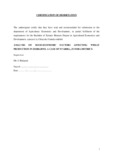Please use this identifier to cite or link to this item:
https://cris.library.msu.ac.zw//handle/11408/355Full metadata record
| DC Field | Value | Language |
|---|---|---|
| dc.contributor.author | Chinyoka, Unanda | - |
| dc.date.accessioned | 2014-08-27T14:03:48Z | - |
| dc.date.available | 2014-08-27T14:03:48Z | - |
| dc.date.issued | 2013 | - |
| dc.identifier.uri | http://hdl.handle.net/11408/355 | - |
| dc.description.abstract | After land reform program in Zimbabwe, wheat production has been on a declining trend, with several constraints being identified hindering wheat production. These include the land policy, wheat pricing policy, high irrigation costs and government protection policies on consumers. As a result farmers have been dropping out of wheat production as it’s no longer a profitable crop to grow. This study is aimed at identifying and quantifying the socio-economic factors affecting wheat production in Nyabira, Zvimba district. The study used primary data collected from a sample of 40 randomly selected household from Nyabira. Descriptive and the Cobb-Douglas production function were used to analyse the socio-economic factors affecting wheat production in Nyabira. The results showed that 85% of the household head attained secondary education level; therefore most of the household head were literate. The majority of the household head were males (75.5%). The regression results showed that fertiliser, area under wheat, distance to the market, price and level of education were positively related to output whilst experience in wheat production was negatively related to output. The farmers also faced so many constraints with power shortages being the highly ranked challenge. The Government, Non-Governmental Organisations and private companies should emphasise on fertiliser, area under wheat, distance to the market, price and level of education so as to increase wheat production in Zimbabwe. The study recommends the government to work in hand with the private sector to introduce inputs for wheat farmers so as to help reduce their costs. | en_US |
| dc.language.iso | en | en_US |
| dc.publisher | Midlands State University | en_US |
| dc.subject | Socio economic, wheat production | en_US |
| dc.subject | Zimbabwe | en_US |
| dc.title | Analysis of socio- economic factors affecting wheat production in Zimbabwe: a case of Nyabira, Zvimba district | en_US |
| item.grantfulltext | open | - |
| item.languageiso639-1 | en | - |
| item.fulltext | With Fulltext | - |
| Appears in Collections: | Bsc Agricultural Economics And Development Honours Degree | |
Files in This Item:
| File | Description | Size | Format | |
|---|---|---|---|---|
| unanda.pdf | 871.35 kB | Adobe PDF |  View/Open |
Page view(s)
156
checked on Jul 26, 2024
Download(s)
112
checked on Jul 26, 2024
Google ScholarTM
Check
Items in MSUIR are protected by copyright, with all rights reserved, unless otherwise indicated.



